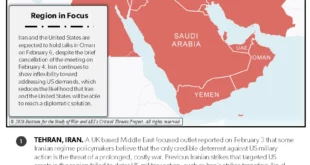
U.S. forces probably will not be a visible presence on Iraq’s streets five years from now, but the United States will remain a force in the country for years to come, Iraq’s ambassador to the U.S. predicted.
American troops will be in Iraq for “a considerable amount of time,” but not in the numbers or position of control they hold today, envoy Samir Sumaida’ie said Thursday.
“Not on the streets,” Sumaida’ie said as President Bush announced gradual reductions in U.S. forces in Iraq over the coming months. The ambassador has lobbied in Washington against a quick exit from the unpopular war but he declined to predict how long the war would last.
“We are not there yet,” Sumaida’ie said, noting gaps in Iraq’s air defenses and other military abilities.
Bush firmly rejected calls to end the unpopular war now in its fifth year. In a national address, Bush insisted that Iraq will still need military, economic and political support from Washington after his presidency ends.
Sumaida’ie rejected the idea that Bush’s decision not to make a major change in strategy relieves pressure on Iraq’s central government. The Baghdad government has been largely paralyzed by political infighting and indecision, and Bush noted that the government has failed to meet some of its own political, security and economic tests.
“People here forget that the biggest pressure on Iraq’s government is not from the United States,” Sumaida’ie said in an interview in his office. “It is from the streets,” in Iraq.
With little change in course, Bush’s decision sets up a ferocious political debate in Congress and on the 2008 presidential campaign trail. Democrats said Bush’s modest approach was unacceptable.
“It’s a relief to us that the policy of the United States will continue to be anchored in the realities of what’s going on in Iraq rather than in the imperatives of the presidential election campaign,” Sumaida’ie said.
Ap
Š
 Eurasia Press & News
Eurasia Press & News



